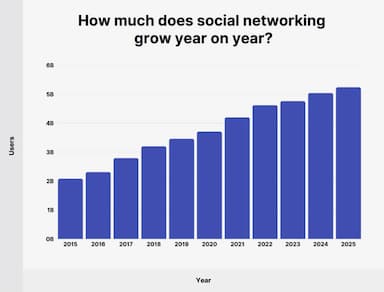The Story is the Star: When Narratives Matter More Than Reality
Social Identities
Politicians, companies, institutions - more and more entities are creating digital identities on the internet. But why? Because in today’s digital landscape, a strong online identity is the key to shaping and spreading their narrative. Take, for example, the rise in social media usage over the past few years. The number of users continues to trend upward, reinforcing why maintaining a strong online identity is not just beneficial, but essential.

Source: Backlinko: Social Media Users
Where Attention Flows, Narratives Grow
In the digital world, attention is the most valuable currency. Wherever people focus their eyes and minds, narratives sprout, evolve, and spread. Social media platforms, powered by algorithms designed to capture and hold our gaze, create fertile ground for stories - sometimes accurate, sometimes distorted. Nonetheless, immense power emerges from these technologies - the power to shape narratives, and through them, influence what people believe. In the digital age, controlling the story means controlling perception, and perception often becomes reality.
This dynamic, however, comes with serious risks. If algorithms determine what content goes viral, they are effectively gatekeepers of our collective attention - and thus our shared reality. These algorithms are optimized not for truth or nuance, but for maximizing human interaction: clicks, likes, shares, and comments. They prioritize what is emotionally engaging, provocative, or sensational because those drive higher engagement.
The result? Content that sparks outrage, fear, or strong emotional reactions often spreads faster and farther than sober facts or complex truths. This optimization creates echo chambers where people are repeatedly exposed to information that confirms their existing beliefs, deepening polarization and making objective reality harder to discern.
When narratives driven by engagement metrics overshadow factual events, the danger is clear: societies can fracture around conflicting perceptions of reality and decisions - both personal and political - are made based on what feels true rather than what is true.
Does The Event Matter?
In this new landscape, the actual even - the raw fact or occurrence - often takes a backseat to how it is framed and shared. The narrative constructed around an event can become more influential than the event itself. What people remember, discuss, and act upon is shaped less by objective reality and more by the stories amplified by social media.
This shift raises a crucial question: if the narrative is what captures attention and spreads, does the event itself really matter? In many cases, the answer appears to be yes - and no. Yes, because facts still ground us in truth and provide the foundation for informed decisions. No, because the emotional resonance and meaning people assign to an event—often shaped by persuasive storytelling—can override the facts, becoming the version of reality they believe and live by.
As narratives grow and evolve independently of the events that sparked them, the distinction between perception and reality blurs. Understanding this helps us navigate a world where the story often becomes the star, and the event merely the stage.
How to protect yourself?
We as humans have a greatest gift—one we need to appreciate and act upon more: consciousness. The key to protecting yourself from misinformation and false narratives lies in consciously consuming content by:
-
Be Critical of Sources
Always check where information comes from. Reliable sources often provide evidence, cite experts, and show transparency. Be cautious of content that appeals mainly to emotions without backing facts.
-
Diversify Your Information
Avoid echo chambers by exposing yourself to a variety of viewpoints. Following different news outlets, creators, and voices helps you see the bigger picture and identify biases.
-
Pause Before Sharing
Before amplifying a story, ask yourself: Is this accurate? Is it complete? Sharing impulsively can spread misinformation and strengthen distorted narratives.
-
Understand Algorithmic Influence
Remember that social media algorithms prioritize engagement, not truth. Be aware of how your feed is curated and take breaks to reduce overexposure to sensationalized content.
-
Fact-Check When in Doubt
Use fact-checking websites and tools to verify claims. Trusted platforms like Snopes, FactCheck.org, or official sources can help separate fact from fiction.
-
Engage Thoughtfully
When discussing online, focus on respectful dialogue and evidence-based arguments. Challenging misinformation calmly can help build understanding rather than deepen divides.
By cultivating these conscious habits, we reclaim control over our digital experience - making choices rooted in awareness rather than impulse, and shaping a more informed, connected world.